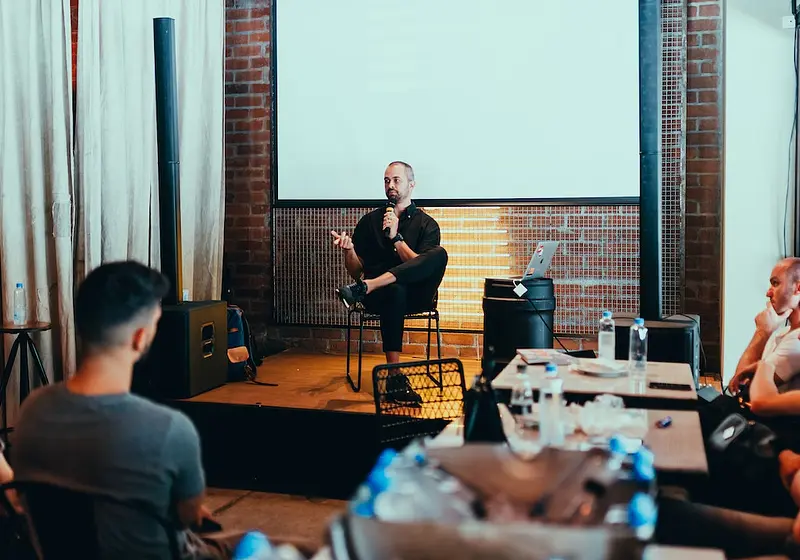If you have ever felt your hands get clammy or your heart pound like a drum just thinking about stepping on stage, you are not alone. Stage fright is something almost everybody feels at one point. It's that mixture of fear and excitement and self-doubt that can make even the most confident person feel a little shaky.
But guess what? It doesn't last forever. With the right mindset and a few quick tips, you can flip it over and channel all that nervous energy into a superpower for performance. Let's go below the surface to see what's really happening when stage fright strikes— and how you can overcome it.
Stage fright is more than just nerves— it is your brain working overtime to protect you. As you are about to perform, your brain decides that being in front of an audience could mean potential danger. This triggers your fight-or-flight response, flooding your system with adrenaline. That is why your hands shake, your voice wobbles, and your mind goes blank.

Image credit: Marcos Luiz Photograph from Unsplash
The good news is that this reaction is not permanent. You can train your brain to see the stage as a safe space. Here are some tried-and-true tips to help you feel more confident in the spotlight:
- Get to the root of your fear
Understand what is making you nervous. Is it a fear of forgetting your lines? A fear of the audience's perception?
When you know what is scaring you, it is easier to find a solution. For example, if you are worried about making a mistake, ensure you prepare adequately so you feel that you can handle anything.
- Practice like a pro
Consistency is key. Practice until the material comes naturally to you. Perform in front of a mirror, record your performance, or do it for a pet (they always make the best audience!). The more acquainted you are with the material, the less space you leave for nervousness and error.
- Start small and build up
If the thought of a large crowd makes your stomach churn, first start with a smaller group. Perform to a few close friends or family members and slowly increase the number of people. This will give you gradual exposure and, over time, help you build your confidence.
- Visualize success
Close your eyes for a few minutes and picture yourself on that stage, killing it. See the people clapping, laughing, and nodding with agreement at what you are saying or doing. Visualization can go a long way in training your mind for success.
- Learn to chill
In times like these, relaxation techniques can be beneficial. Deep breathing exercises, such as the 4-4-4 method (inhale for four counts, hold for four, exhale for four), can quickly help you center yourself. Progressive muscle relaxation, which involves tensing and releasing different muscle groups, can also be effective. These techniques can help you create harmony between your mind and body, promoting a sense of calm.
- Keep your eye on the ball
Rather than focusing on how you look or sound, fix your mind on what you want to share with the audience. Be it a speech, song, or role in a play, the message is what truly matters. Concentrating on reaching out to your listeners will dispel any self-doubt.
- Get familiar with mistakes
Here’s a secret: even the pros make mistakes. The difference is that they don’t let it ruin their performance. If something goes wrong, laugh it off or just carry on as if nothing happened. Chances are your audience won’t notice.
- Get feedback (and use it)
Ask someone you trust to watch your performance and provide constructive feedback. It can be a little nerve-wracking, but this person’s insights can help you improve and become more confident. Plus, knowing someone has your back can make a huge difference.
- Give yourself courage
Before you go on stage, take a moment to cheer yourself up. Positive self-talk can work wonders. Tell yourself things like “I can do this” or “I’m ready to shine.” A little motivation can go a long way in boosting your confidence.
- Remember, the audience is on your side
Most audience members want you to succeed. They’re not there to judge you; they’re there to enjoy what you have to offer. Keeping this in mind can take a lot of the pressure off your shoulders.

Image credit: Wan San Yip from Unsplash
"It’s not the fear that we have to overcome, but the judgment we think others have of us." – Brene Brown
Overcoming stage fright doesn’t happen overnight. It takes time and effort to become comfortable in front of an audience. Every time you step on stage, whether for a class presentation or a big performance, you’re building resilience and gaining experience.
The more you face your fears, the easier it gets. Start small, celebrate your wins, and don’t be afraid to push yourself a little further each time. Even the biggest stars started somewhere— and they’ve all had their share of flubbed lines and missteps. What matters is that they didn’t let it stop them, and neither should you.
Stage fright might feel overwhelming at first, but it’s really just a sign that you care about what you’re doing. With a little practice and the right mindset, you can turn those nerves into excitement and step onto that stage with confidence. So the next time you’re in the spotlight, take a deep breath, smile, and remember: you’ve got this!

Image credit: Kane Reinholdsten from Unsplash




.jpg)
.jpg)


